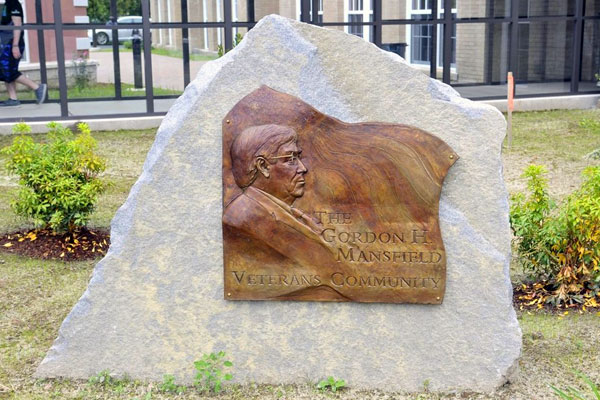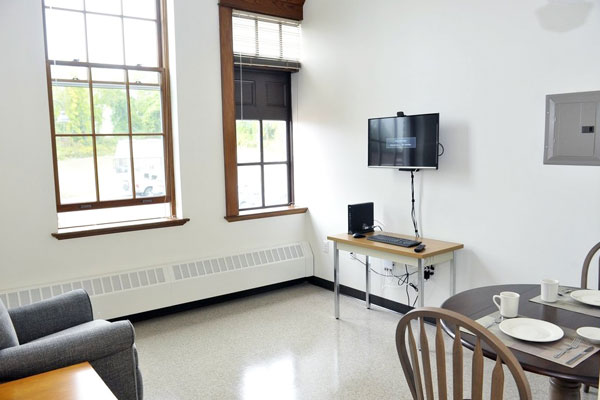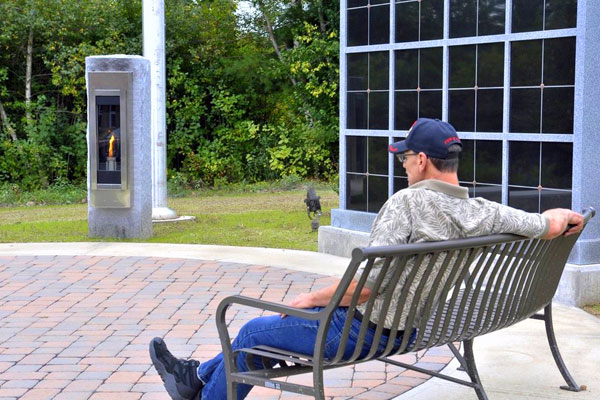01 Feb HUB Community Spotlight: Get To Know Soldier On
When Veterans Day comes around each November, it is always a wonderful opportunity to honor those who have served in the military and to recognize the sacrifices these men and women have made on behalf of our country. However, veterans of all ages truly need and deserve our support all year round.
That’s why the HUB International team would like to introduce you to an organization called Soldier On, that prioritizes the needs of veterans 365 days a year. This private nonprofit organization headquartered in Western Massachusetts provides important programs and services to veterans from all over who can face many difficulties, including health issues, addiction, loneliness, and homelessness.
In this, our third installment of the HUB International Community Spotlight Series, we speak with Bruce Buckley, Soldier On’s President and CEO, to learn more about how this agency assists veterans who are homeless, suffering from addiction, and/or dealing with mental illness. Soldier On’s goal is to provide homeless veterans with permanent, supportive, sustainable housing, and, ultimately, assist them in transitioning from homelessness to homeownership.
“I am so thankful that Soldier On is part of our Western Massachusetts community and providing critical services to our veterans who are homeless or otherwise challenged,” says HUB International President and CEO Bill Trudeau. “This organization promotes the dignity of each and every person and reminds us all to be mindful that every individual has had unique life experiences. HUB International is proud to support Soldier On’s mission of valuing and caring for our veterans in any way that we can.”
HUB Q&A with Bruce Buckley, President and CEO of Soldier On
ICNE: Could you describe the services Soldier On provides to veterans?
Mr. Buckley: Soldier On provides transitional and permanent housing to men and women who have previously served in the U.S. military. Our program is mainly focused on helping our residents build social skills and create strong relationships with one another. In addition, we supply meals, transportation, education, and financial and legal assistance to all those we serve, as well as assistance with veterans’ healthcare needs. This includes a wide range of treatment groups that address specific needs. Our many resources, such as financial awareness classes, resume building workshops, and interview preparation are readily available to residents and ensure their success during and after their time with us. Because every veteran has unique needs, case managers work one-on-one with each resident to create a specialized plan that addresses their needs and personal goals. We would not be able to do this without our wonderful team of highly trained staff, a network of dedicated professionals, and, of course, our loyal volunteers. All of us are committed to one singular goal, which is to put an end to veteran homelessness.
ICNE: How did Soldier On originate?
Mr. Buckley: In 1994, the United States Department of Veterans Affairs, which most people know as the VA, acknowledged that homelessness was more prevalent among veterans. At that time, veteran homelessness was estimated to occur four times more frequently than incidences of homelessness in the general population. In an attempt to curtail this situation and improve the lives of struggling veterans, the VA initiated the Grant and Per Diem Program. Its sole purpose was to supply funding to nonprofit organizations that provided food, clothing, and housing to veterans in need. Soldier On was one of the nonprofits that was established as a result of this initiative.
ICNE: What are some of the causes of homelessness among veterans and how does Soldier On address this problem as an organization?
Mr. Buckley: Substance abuse and untreated mental illness, including Post-traumatic Stress Disorder (PTSD), are often underlying causes for homelessness among veterans. In addition, unexpected economic and life events such as divorce, unemployment, or illness are also factors that frequently lead to veteran homelessness. What all of these factors have in common is that they leave the veteran without a support system and feeling isolated from family and friends.
By offering homeless veterans a community where they feel comfortable and supported by our responsive staff, longtime volunteers from the surrounding area, and other empathetic veterans, they develop a sense of belonging and inclusion. While we have built beautiful facilities for our veterans, the success of our residential program is primarily due to the strong sense of unity and the family environment that it fosters.
ICNE: Since its inception in 1994, how has Soldier On grown or changed?
 Mr. Buckley: In 2002, Soldier On expanded its focus to include a broader range of services for veterans, starting with a program for providing them with emergency and transitional housing. This program provided homeless veterans with a residence where they could stay for up to two years and receive financial assistance, health care, and other services until they were ready to enter society independently again. We opened our first transitional facility in Leeds, Massachusetts on what is known as the “VA Campus.” This facility contains units that provide shelter to men and women who otherwise might not have a place to sleep. Soldier On now has three transitional facilities, two in Northampton and one in Pittsfield. On any given night, we have the ability to house 230 veterans. Once an individual exits our transitional program they may end up in our permanent housing program or return to the community.
Mr. Buckley: In 2002, Soldier On expanded its focus to include a broader range of services for veterans, starting with a program for providing them with emergency and transitional housing. This program provided homeless veterans with a residence where they could stay for up to two years and receive financial assistance, health care, and other services until they were ready to enter society independently again. We opened our first transitional facility in Leeds, Massachusetts on what is known as the “VA Campus.” This facility contains units that provide shelter to men and women who otherwise might not have a place to sleep. Soldier On now has three transitional facilities, two in Northampton and one in Pittsfield. On any given night, we have the ability to house 230 veterans. Once an individual exits our transitional program they may end up in our permanent housing program or return to the community.
ICNE: Why did Soldier On decide to create permanent housing options for veterans in addition to transitional ones?
Mr. Buckley: One of the things we learned through our experience with our first transitional house in Leeds was that, after leaving this supportive residential environment, some of the veterans would relapse into homelessness or drug and alcohol abuse. To address this issue, Soldier On developed a permanent housing program for veterans on our Pittsfield campus. This permanent housing facility, named The Gordon H. Mansfield Veterans Community after the former Deputy Secretary of Veterans Affairs, initially provided a lifelong home and critical support services for only 39 veterans.
Now, we have four permanent housing facilities, the latest of which opened in Agawam, Massachusetts with 51 units that veterans may occupy for life. All of these housing projects are made possible through the work of the Soldier On Development and Management Company (SODMC). This national housing development agency is behind the many moving parts of all of our building projects, including the financial, legal, design, and construction details.
ICNE: How would you describe Soldier On’s living accommodations?
 Mr. Buckley: 92% of veterans that move in to a Soldier On facility stay there for life, so we are dedicated to providing them with exceptional housing. Our permanent living facilities would remind you of an apartment designed for a single person. Each resident’s living space is equipped with a kitchenette, a living area with a television, storage spaces, a bedroom, and a full bathroom. Cable and Wi-Fi are also provided along with communal laundry facilities. Our transitional facilities are more basic and utilize more shared spaces for living, often with four to five beds per room. Veterans seeking permanent accommodations can easily transition from one of our temporary facilities to a permanent one where they may stay indefinitely.
Mr. Buckley: 92% of veterans that move in to a Soldier On facility stay there for life, so we are dedicated to providing them with exceptional housing. Our permanent living facilities would remind you of an apartment designed for a single person. Each resident’s living space is equipped with a kitchenette, a living area with a television, storage spaces, a bedroom, and a full bathroom. Cable and Wi-Fi are also provided along with communal laundry facilities. Our transitional facilities are more basic and utilize more shared spaces for living, often with four to five beds per room. Veterans seeking permanent accommodations can easily transition from one of our temporary facilities to a permanent one where they may stay indefinitely.
At Soldier On, we work with veterans that have had very little stability in their lives since returning from service. So, our goal from the beginning was to make these permanent residences a home that anybody would be proud to live in and that would help them feel like they have some permanence in their lives.
ICNE: What are the special services and programs available to veterans living in a Soldier On community?
Mr. Buckley: There are many important services that Soldier On provides to veterans at our permanent housing facilities, starting with a nutritional well-balanced meal a day. We also encourage and support cooking within one’s living facility because it helps the individual develop a sense of responsibility and independence.
In addition to rebuilding good nutritional habits, promoting the physical health and wellness of veterans, including reteaching proper hygiene, encouraging relaxation, and reintroducing exercise routines is important to Soldier On. When a veteran starts to look and feel better, they begin to gain back valuable self-esteem that may have been lost during homelessness.
Many veterans come to our facility with a poor credit history, so providing veterans with an education on how to manage their finances is critical. We give them all the tools they need to repair their credit, improve their financial standing and gain financial independence.
We also have a full-time, onsite attorney who can assist veterans with legal issues, such as unpaid speeding tickets or other violations that might be preventing them from getting their driver’s license. In addition, they help to create wills and healthcare proxies for our residents.
Because many of our veterans are not from the towns where our facilities are located and may not have access to transportation back to their hometown, we make sure that they can get to important events, such as local, primary and general elections, as well as appointments and services that are not offered at our residences.
Homelessness typically denies veterans access to the extracurricular activities that they may have loved prior to becoming homeless, such as painting, golfing, or playing an instrument. These activities can be highly therapeutic, therefore Soldier On offers veterans the option to participate in programs in the arts, music, sports, and other hobbies.
 Finally, since many of our veterans grow old with us, we have developed programs to help them through their later years. We’ve built relationships with nursing homes where veterans can move when they can no longer live on their own in one of our residences. However, sincemost of our units are wheelchair accessible and healthcare can be provided on site, many of our veterans are able to live out their life with us. If a resident must transition to a nursing home, though, we do not lose a connection with them. Rather, we provide transportation so that they can come back to the Soldier On community for meals and activities as often as possible and we make every effort to visit them regularly as well.
Finally, since many of our veterans grow old with us, we have developed programs to help them through their later years. We’ve built relationships with nursing homes where veterans can move when they can no longer live on their own in one of our residences. However, sincemost of our units are wheelchair accessible and healthcare can be provided on site, many of our veterans are able to live out their life with us. If a resident must transition to a nursing home, though, we do not lose a connection with them. Rather, we provide transportation so that they can come back to the Soldier On community for meals and activities as often as possible and we make every effort to visit them regularly as well.
We do conduct funerals for veterans who have passed away while living in our permanent housing facilities. Soldier On has its own clergyman for this purpose and it is an important part of how we look after our residents. All of our permanent housing facilities have a columbarium on the property with a symbolic, eternally burning flame. This is not only a special place where veterans can visit those members of the Soldier On family who have now passed on, but it is also our way of letting veterans know that Soldier On is truly their home forever.
ICNE: Part of the Soldier On mission is to transition veterans from homelessness to homeownership. How does your organization facilitate this?
Mr. Buckley: Soldier On has created a program called Limited-Equity Cooperative in which a veteran is able to take financial responsibility for the original living space they were given, over time, without having to go through the stress of the normal home buying or loan process.
Even if they do not become homeowners, veterans at our permanent housing facilities do pay a monthly rent, the cost of which is highly subsidized. Taking financial responsibility for their living space is just one of the many ways that helps our veterans feel more a part of the community they live in.
ICNE: What is the Supportive Services for Veteran Families (SSVF) Program at Soldier On?
Mr. Buckley: The Supportive Services for Veteran Families (SSVF) Program at Soldier On is a door-to-door outreach campaign assisting veterans and their families who are at risk of becoming homeless, not only in Western Massachusetts, but also in counties across New York State, central New Jersey, and western Pennsylvania. In these areas, Soldier On partners with local nonprofits to provide in-home case management, referral services, help in obtaining health care services, financial planning services, transportation, fiduciary and payee services, legal services, housing counseling, and, in some cases, temporary financial assistance for rent, security and utility deposits, utility fees, moving costs, child care, emergency supplies and transportation. Our hope is that we can intervene by offering much needed support and services that will help to stabilize the living situation of veterans and their families so that they don’t have to face the difficulties of homelessness.
ICNE: How can members of the community contribute to Soldier On?
Mr. Buckley: We always welcome people to make monetary donations online at wesoldieron.org/donate. In addition, we accept donations of goods which you can mail to us or drop off at our Leeds, Massachusetts location. On our website, you will find a wish list of items for our residents that includes toiletries, bedding, and art supplies.
We also encourage you to keep an eye out for events that you, your family or your company might like to participate in. The team at HUB International has participated in several Soldier On events, including new facility openings and our annual golf tournament fundraiser. They also regularly visit our residences and stay updated on all the services and programs that we are providing to veterans by following us in the news.
With the community’s continued support, we hope to replicate our Massachusetts model of providing housing and supportive services to veterans all across the U.S.
Get to know the remarkable nonprofits in your community
We hope that you have enjoyed learning about Soldier On and the vital support this organization provides to our local veterans. In the next installment of our Spotlight Series, HUB International will be introducing you to the Western Massachusetts Training Consortium, Inc., a learning organization that empowers individuals to overcome barriers and pursue their goals and aspirations.
For a list of other outstanding, local organizations that HUB International proudly supports, please visit our In the Community page or read our past community spotlights by clicking any of the links below:


No Comments